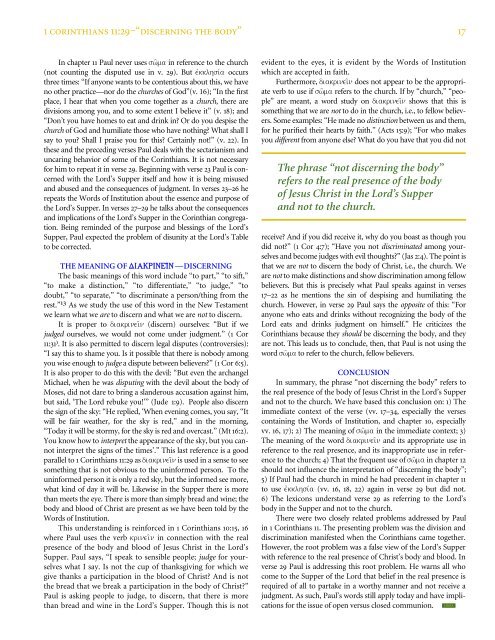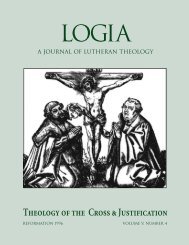03-1 Pastoral Care.pdf
03-1 Pastoral Care.pdf
03-1 Pastoral Care.pdf
- No tags were found...
You also want an ePaper? Increase the reach of your titles
YUMPU automatically turns print PDFs into web optimized ePapers that Google loves.
1 CORINTHIANS 11:29‒“DISCERNING THE BODY” 17In chapter 11 Paul never uses sw'ma in reference to the church(not counting the disputed use in v. 29). But ejkklhsiva occursthree times: “If anyone wants to be contentious about this, we haveno other practice—nor do the churches of God”(v. 16); “In the firstplace, I hear that when you come together as a church, there aredivisions among you, and to some extent I believe it” (v. 18); and“Don’t you have homes to eat and drink in? Or do you despise thechurch of God and humiliate those who have nothing? What shall Isay to you? Shall I praise you for this? Certainly not!” (v. 22). Inthese and the preceding verses Paul deals with the sectarianism anduncaring behavior of some of the Corinthians. It is not necessaryfor him to repeat it in verse 29. Beginning with verse 23 Paul is concernedwith the Lord’s Supper itself and how it is being misusedand abused and the consequences of judgment. In verses 23–26 herepeats the Words of Institution about the essence and purpose ofthe Lord’s Supper. In verses 27–29 he talks about the consequencesand implications of the Lord’s Supper in the Corinthian congregation.Being reminded of the purpose and blessings of the Lord’sSupper, Paul expected the problem of disunity at the Lord’s Tableto be corrected.THE MEANING OF DIAKRINEI'N—DISCERNINGThe basic meanings of this word include “to part,” “to sift,”“to make a distinction,” “to differentiate,” “to judge,” “todoubt,” “to separate,” “to discriminate a person/thing from therest.” 13 As we study the use of this word in the New Testamentwe learn what we are to discern and what we are not to discern.It is proper to diakrinei'n (discern) ourselves: “But if wejudged ourselves, we would not come under judgment.” (1 Cor11:31). It is also permitted to discern legal disputes (controversies):“I say this to shame you. Is it possible that there is nobody amongyou wise enough to judge a dispute between believers?” (1 Cor 6:5).It is also proper to do this with the devil: “But even the archangelMichael, when he was disputing with the devil about the body ofMoses, did not dare to bring a slanderous accusation against him,but said, ‘The Lord rebuke you!’” (Jude 1:9). People also discernthe sign of the sky: “He replied, ‘When evening comes, you say, “Itwill be fair weather, for the sky is red,” and in the morning,“Today it will be stormy, for the sky is red and overcast.” (Mt 16:2).You know how to interpret the appearance of the sky, but you cannotinterpret the signs of the times’.” This last reference is a goodparallel to 1 Corinthians 11:29 as diakrinei'n is used in a sense to seesomething that is not obvious to the uninformed person. To theuninformed person it is only a red sky, but the informed see more,what kind of day it will be. Likewise in the Supper there is morethan meets the eye. There is more than simply bread and wine; thebody and blood of Christ are present as we have been told by theWords of Institution.This understanding is reinforced in 1 Corinthians 10:15, 16where Paul uses the verb krinei'n in connection with the realpresence of the body and blood of Jesus Christ in the Lord’sSupper. Paul says, “I speak to sensible people; judge for yourselveswhat I say. Is not the cup of thanksgiving for which wegive thanks a participation in the blood of Christ? And is notthe bread that we break a participation in the body of Christ?”Paul is asking people to judge, to discern, that there is morethan bread and wine in the Lord’s Supper. Though this is notevident to the eyes, it is evident by the Words of Institutionwhich are accepted in faith.Furthermore, diakrinei'n does not appear to be the appropriateverb to use if sw'ma refers to the church. If by “church,” “people”are meant, a word study on diakrinei'n shows that this issomething that we are not to do in the church, i.e., to fellow believers.Some examples: “He made no distinction between us and them,for he purified their hearts by faith.” (Acts 15:9); “For who makesyou different from anyone else? What do you have that you did notThe phrase “not discerning the body”refers to the real presence of the bodyof Jesus Christ in the Lord’s Supperand not to the church.receive? And if you did receive it, why do you boast as though youdid not?” (1 Cor 4:7); “Have you not discriminated among yourselvesand become judges with evil thoughts?” (Jas 2:4). The point isthat we are not to discern the body of Christ, i.e., the church. Weare not to make distinctions and show discrimination among fellowbelievers. But this is precisely what Paul speaks against in verses17–22 as he mentions the sin of despising and humiliating thechurch. However, in verse 29 Paul says the opposite of this: “Foranyone who eats and drinks without recognizing the body of theLord eats and drinks judgment on himself.” He criticizes theCorinthians because they should be discerning the body, and theyare not. This leads us to conclude, then, that Paul is not using theword sw'ma to refer to the church, fellow believers.CONCLUSIONIn summary, the phrase “not discerning the body” refers tothe real presence of the body of Jesus Christ in the Lord’s Supperand not to the church. We have based this conclusion on: 1) Theimmediate context of the verse (vv. 17–34, especially the versescontaining the Words of Institution, and chapter 10, especiallyvv. 16, 17); 2) The meaning of sw'ma in the immediate context; 3)The meaning of the word diakrinei'n and its appropriate use inreference to the real presence, and its inappropriate use in referenceto the church; 4) That the frequent use of sw'ma in chapter 12should not influence the interpretation of “discerning the body”;5) If Paul had the church in mind he had precedent in chapter 11to use ejkklhsiva (vv. 16, 18, 22) again in verse 29 but did not.6) The lexicons understand verse 29 as referring to the Lord’sbody in the Supper and not to the church.There were two closely related problems addressed by Paulin 1 Corinthians 11. The presenting problem was the division anddiscrimination manifested when the Corinthians came together.However, the root problem was a false view of the Lord’s Supperwith reference to the real presence of Christ’s body and blood. Inverse 29 Paul is addressing this root problem. He warns all whocome to the Supper of the Lord that belief in the real presence isrequired of all to partake in a worthy manner and not receive ajudgment. As such, Paul’s words still apply today and have implicationsfor the issue of open versus closed communion. LOGIA
















